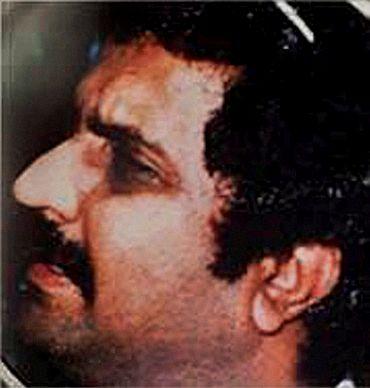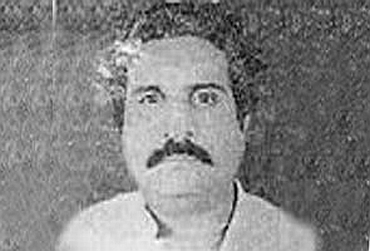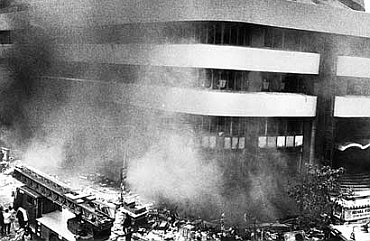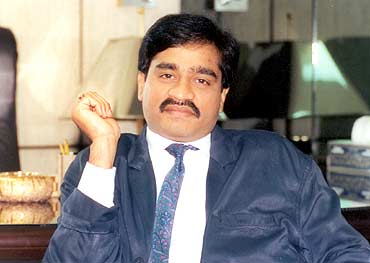Iqbal Mirchi, drug lord and aide of underworld don Dawood Ibrahim, was released on bail in London on October 20. And India's chase of Mirchi continues 17 years after he fled the nation. However, not all hope is lost. There's a possibility of him being deported some time next year. Toral Varia reports
The Central Bureau of Investigation dossier (external link) on Iqbal Memon, popularly known as Iqbal Mirchi or Iqbal Merchant, describes him as a man with a height of 168 cm, black hair, black eyes and a mole on his left arm. Sources in Indian intelligence agencies describe him as the right hand man of fugitive underworld don Dawood Ibrahim. It was in 1994 that the CBI had issued an Interpol notice against Mirchi, one of India's most wanted. India has sought his extradition the past, but it was turned down.
"India tried extraditing him earlier on the basis of two cases but failed. After that no new case has been filed against Mirchi. According to the rulebook, the same cases cannot be taken up again to seek extradition once they have been rejected by the country from where the accused is wanted. So on what basis will India extradite him?" asked a senior police official.
However, all hope is not lost for India, as there is still a chance of Mirchi's deportation. Currently, he does not own any valid passport as Indian authorities had rejected his renewal application. Moreover, the leave to reside indefinitely granted by the British Home Office to Mirchi was cancelled a while ago. As of now his permission to live in London expires in 2012. In event that his application for renewal is not accepted by the British authorities then according to the law, Mirchi will be deported to his home country.
...
Dawood aide Mirchi to be deported to India in 2012?
Image: Mirchi fled India in 1994On October 14, a day after Mirchi was arrested in London for threatening to kill his associate Nadeem Kader, Maharashtra Home Minister R R Patil had announced that there are as many as 12 cases registered against him. This was confirmed by Mumbai's Joint Commissioner of Police (crime) Himanshu Roy. "The Mumbai police is preparing to extradite Iqbal Memon alias Iqbal Mirchi," he said.
However, sources within the Crime Branch interpret these claims as 'opportunistic'. The Crime Branch is now confronted with the task of collecting appropriate evidence and documentation that can sustain the rigorous scrutiny of the London courts. But officers doubt that this whole 'proposed extraction plan' will ever reach a conclusive stage.
There is no new evidence, case or development that can strengthen India's case against Mirchi. Collating evidence is also difficult as most of the cases are over two decades old and case papers of dormant files have either been disposed off or misplaced following computerisation of records, say insiders.
According to the Mumbai Crime Branch, Mirchi is wanted in connection with 12 serious offences, including two murders and three cases of narcotics smuggling under the Narcotic Drugs and Psychotropic Substances Act. However, the last offence against him was registered in 1994.
Dawood aide Mirchi to be deported to India in 2012?
Image: Mirchi was wanted for his role in the 1993 Mumbai serial blasts, but his name was later clearedIndia unsuccessfully tried seeking his extradition in 1995. Of the 12 cases, one was registered in November 1993 where high quantities of mandrax (a sedative-hypnotic drug) tablets were seized from a jeep parked outside Nehru Planetarium. Back then the Mumbai Crime Branch had arrested one Kantilal Jogani (now dead) who had informed the police that the mandrax consignment actually belonged to Mirchi. Further investigation lead seizures of similar consignments in a couple of more places in Mumbai and Pune.
The second case, on the basis of which India tried to seek Mirchi's extradition, was the murder of Amar Suvarna, a former manager of his rice mills in London. Suvarna was murdered outside Trishna restaurant in south Mumbai.
Despite best efforts to build a strong case, India failed to not only extradite Mirchi, but also ended up paying a penalty of over Rs 80 lakh to authorities in London. "Back then the London court observed that the evidence against Mirchi was 'insufficient' and 'legally inadmissible'. So far, no new evidence has surfaced," said Rizwan Merchant, Mirchi's lawyer in India.
According to Merchant, CBI's Special Task Force looking into the 1993 serial bomb blasts case tried really hard to implicate Mirchi. "But they could not find any evidence and eventually also held a press conference clearing his name."
Mirchi has been living in London's posh Essex town of Hornchurch for the past 16 years. He is said to be shuttling between London and Dubai. His 'permission to reside indefinitely in UK' was cancelled some time ago following one of his Dubai trips, say sources.
In London, Mirchi is said to have an established business of rice mills and has set up a chain of five star hotels including Imperial Suites in Dubai.
In April 1995, Scotland Yard sleuths arrested Mirchi and raided his Essex town residence on charges of drugs and terrorism. The investigation, which ended five years later, exonerated him of any criminal activity and earned him indefinite leave to remain in UK from 2001. This leave was cancelled shortly after his name figured in the top 50 global drug barons list released by the United Nations. He has also been described by the United Nations as a 'senior figure in the D company'
Merchant retorts, "If Mirchi was wanted globally then what is stopping US and UK from arresting him. They tried it once, they found no evidence."
It is also learnt that Mirchi has written to authorities in the United States and United Nation to clear his name.
Dawood aide Mirchi to be deported to India in 2012?
Image: Mirchi is a close aide of underworld don Dawood IbrahimFrom cabbie to drug baron:
Mirchi is said to have worked as taxi driver for small time drug lords in Mumbai. It was in the late 1980s that he came in contact with Dawood Ibrahim and the two became close. He fled India in 1994.
Mirchi's family traded in spices, especially chilies, thus earning him the nickname. Mirchi married twice. One of his daughters is married and settled in UK itself, while one of his sons Asif and his second wife Aziza visit Mumbai when needed.
Even as India's attempts at extraditing the drug lord failed, authorities in India seized and auctioned several of Mirchi's properties. A bungalow in Bhopal's posh Nadir Colony, situated very close to the official residence of Madhya Pradesh Chief Minister Shivraj Singh Chauhan and Congress General Secretary Digvijaya Singh, is yet to be sold off. Reportedly, Mirchi is said to have duped and ailing old Anglo-Indian woman and purchased the property.
Detention orders were issued against him and his first wife Heena Kausar soon after they fled the country following the serial bombings in 1993. Kausar has moved the Bombay high court to stake her claim on two prime properties in Mumbai. In her application, she has appealed to the court to revoke the detention order on her and Mirchi so that the seal on two flats located in Milton Apartments in Mumbai's Juhu Tara Road can be broken.
Veteran Birtish journalist from The Observer, Tony Thompson feels that Mirchi has 'mastered the art of distancing himself from the criminal activity he is said to control.' Thomson is one of the few who has visited Mirchi's palatial house in London. "It's a large, detached, six-bedroom house in an exclusive part of Hornchurch with two luxury cars in the driveway. The living room is finished with dark wood floors and walls, furnished with two cream leather sofas and dominated by an enormous running machine," he said.
Recalling his meeting with Mirchi, Thompson told rediff.com, "At first he seemed more frightened of me than I was of him. He seemed tensed and unhappy that a journalist has turned up at his house. But when he realised that I was only after the truth he let me in and at the end of my interview he even offered to drive me in his car to the station."





article